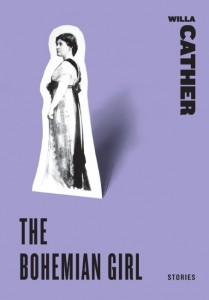 I initially resisted Harper Perennial’s Fifty-Two Stories, a website on which a different piece of short fiction will be posted every week for a year because it is first and foremost a marketing tool. Since last week’s post, though, of “Radical Adults Lick Godhead Style” by Peter Wild, en suite of Willa Cather’s “The Sculpter’s Funeral,” I’ve abandoned, if only for the moment, such righteousness in favor of real admiration.
I initially resisted Harper Perennial’s Fifty-Two Stories, a website on which a different piece of short fiction will be posted every week for a year because it is first and foremost a marketing tool. Since last week’s post, though, of “Radical Adults Lick Godhead Style” by Peter Wild, en suite of Willa Cather’s “The Sculpter’s Funeral,” I’ve abandoned, if only for the moment, such righteousness in favor of real admiration.
As an increasingly peripheral writer – and more personally, my namesake – I delight in any modern-day mention of Willa Cather’s “simple and sophisticated” fascination with the American landscape, and the presence of Cather’s piece was what attracted me to Fifty-Two Stories in the first place. Wild’s story on the other hand, is extracted from Noise, a recently published collection of fiction inspired by the band Sonic Youth. It is experimental and jolting, and a clear contrast to Cather’s “100-year-old minimalism,” as Carolyn Kellogg of the LA Times’ JacketCopy calls it. Cal Morgan, the site’s ringmaster, describes “Radical Adults” as “a lesson in the versatility of fiction,” and Cather’s “Funeral,” as a study in the “disaffection between rural and urban, simple and sophisticated, young and old.” The two pieces, published over a century apart, are wholly opposite in nature. What they do have in common, quite simply, is their chosen format: the honorable short story.
For me to be so anti-capitalist as far as the arts are concerned is perhaps excessive in the first place, and whether or not Harper Perennial believes it, the website’s layout functions as an homage to short fiction, a form which regrettably takes a continual backseat to the naturally more grandiose novel. A page refresh of Fifty-Two Stories generates a new citation, taken from various literary personages such as Neil Gaimen, Ray Bradbury, and Richard Russo, on the unusual and necessary beauty of the short story. Here, also, is a list from BookFox of famous writers on short stories. (Kafka calls the short story “a cage in search of a bird,” William Carlos Williams “the flare of a match struck in the dark.”) I’m pleasantly reminded of a New York Times essay from last October, “The Ambition of the Short Story” by Stephen Millhauser. This essay, in a brand of quirky precision unusual to the venerable news source, presents in a most passionate and effective manner a similar homage to the marginalized form:
“The novel leaps restlessly from place to place, always hungry, always dissatisfied, always fearful of coming to an end–because when it stops, exhausted but never at peace, the world will have escaped it. The short story concentrates on its grain of sand, in the fierce belief that there-right there, in the palm of its hand-lies the universe…Its method is revelation. Its littleness is the agency of its power. The short story apologizes for nothing. It exults in its shortness. It wants to be shorter still. It wants to be a single word. If it could find that word, if it could utter that syllable, the entire universe would blaze up out of it with a roar. That is the outrageous ambition of the short story, that is its deepest faith, that is the greatness of its smallness.”
I do guarantee a single read of Millhauser’s essay will incite in you a newfound appreciation of the short story, if not an uncontrollable impulse to gather and reread every short story collection on your bookshelf. At the very least, you will certainly Digg, Twitter, Facebook, or Delicious Harper Perennial’s newest and thoroughly honorable marketing venture.

No comments
Hi there. Thought you might be interested in this: http://jkfowler.com/2009/11/14/feather-figure/ . Cheers, JK